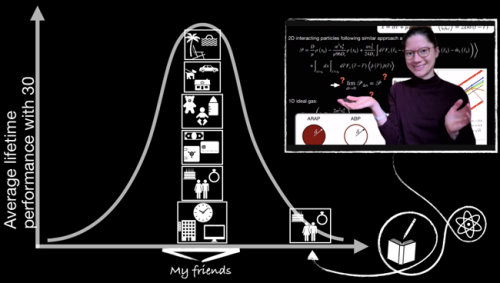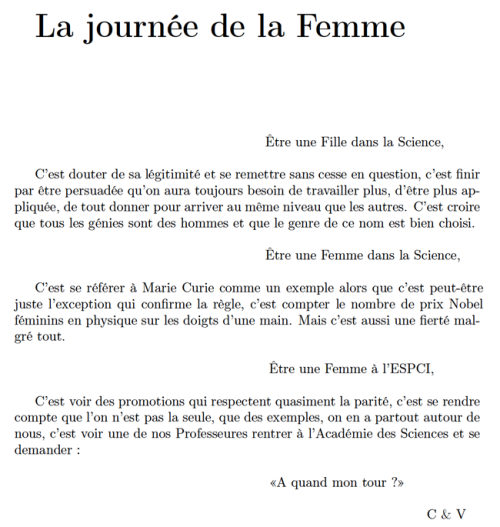A l’occasion du 11 février, Journée Internationale des femmes et des filles de science, nous souhaitions donner la parole à nos chercheuses, ingénieures, élèves pour nous livrer une part de leur quotidien, leurs motivations, et leurs réflexions.
Juliane Klamser
Cécile Davrinche et Valentine Rollot
Chloé Dupuis
Surabhi K. Sreenivas
Juliane Klamser
Juliane Klamser est post-doctorante au laboratoire Gulliver, qu’elle a rejoint en 2019. elle s’intéresse à la physique statistique de la matière active.

Out-of-the-norm to the power of two
(Paris, 11th Feb. 2020)
Today is my birthday. I am turning 30. The vast majority of my friends are settled. They bought houses, have children, and have stable jobs. Well, I am a postDoc, I still live in a one-room apartment with a shared toilet and shower on the corridor, and my husband lives 4.5 hours away. No, not 4.5 hours by car. That’s the time difference on our watches…
In comparison with my entourage, I am out of the norm. When we are out of the norm, we have a quite good inbuild alarm system shouting at us : "Hey, what the hell are you doing there ? Get back on track !"
This alarm runs as constant background noise, sometimes louder and sometimes almost inaudible, but certainly always disturbing and irritating. Recently, I found the volume control : I realized that I am already on track. It’s my track to a life where I can do every day what I am passionate about. For me that is science, learning about our world, asking one question, just to find ten more, and finally finding an unexpected answer which is neither good nor bad but just true and pure.
If the energy of passion would be sufficient to power this volume control, I would never have heard even the tiniest whisper of this pathetic alarm bell. Unfortunately, passion needs confidence as a catalyzer for this task and here we come to the point…
Confidence makes the difference between a dream and a goal. We will only become what we believe that we can become. It is exactly here where our society builds brick walls with barbed wire for men who want to work in a kindergarden and for women who want to be theoretical physicists.
It is no news that we are put into boxes from early childhood on. Girls like pink, boys like blue. Girls want to be flight attendants and boys the pilot. Girls are good in biology, boys are good in math. Girls must be pretty and empathetic, boys must be strong and dominant. When I think about stereotypes, I get deeply frustrated and angry. Frustrated, because I feel like Don Quixote and angry because I am myself not able to overcome them.
I started physics with : „You think I will not be able to understand this ? Well, I will prove you wrong !“ This worked very well while there were objective measures like exam marks for comparison. Graduating from university, meant to lose these regular measures as proof for me being at the right place, doing the right thing.
I was not prepared for this loss. In research, you constantly need to prove that you are good enough, that you belong. This task becomes difficult if you are not fitting in right from the beginning, and infinitely harder when other people make you feel that. I stress that this is not at all limited to women wanting to do science (you may deviate from the norm in other ways). The weak point is the confidence but confidence makes all the difference. Without it, goals become dreams and a passion becomes a liking and long working days become a burden.
This is what I wanted to share.
If you read until here and you lie within the comfy standard deviation : In the best case your takeaway is to give some positive-feedback credit to the youngsters, it may pay back tenfold !
If you rather belong to the large-deviation minority and you relate to this text : You might not always be lucky to have people around you who do not shy away to tell you what an awesome, hard-working, sincere scientist you are. If your confidence becomes a moody character with the tendency to autodestruction, then consider the following. If you do not believe that you can make it, how do you expect that others can ? If you feel that your self-esteem is on holiday, do not wait and talk about it ! Ask your supervisor/collaborator/colleagues for feedback. You will be surprised about the responses you get !
Cécile Davrinche et Valentine Rollot
IngénieurEs de la 136ème promotion, Cécile et Valentine sont en 4ème année, donc de spécialisation. Elles nous livrent, une réflexion vive à la fois critique et enthousiaste.

Chloé Dupuis
Doctorante de Sorbonne Université au Laboratoire de Physique et Mécanique des Milieux Hétéorgènes, Chloé travaille sur la culture de cellules neuronales en 3D.
j’aimerais dire qu’il n’y a pour moi pas de distinction entre femmes et hommes de sciences. Bien sûr, nous souffrons de discrimination depuis des centaines d’années mais aujourd’hui, j’ai vraiment l’impression que nous sommes de plus en plus respectées à notre juste valeur. Je vois tous les jours, dans les laboratoires où j’évolue, des femmes ingénieures, techniciennes, chercheuses, cheffes d’équipe ou même cheffes de laboratoire. Certains postes à responsabilité restent compliqués à obtenir mais j’ai bon espoir que, dans les années à venir, cette distinction s’atténue au point où on ne se posera même plus ce genre de question. Nous sommes au début d’un nouveau siècle, d’un nouveau millénaire, et l’histoire que nous écrirons ensemble sera basée sur l’égalité entre les femmes et les hommes, j’en suis persuadée. J’aimerais donc dire à toutes les jeunes filles, à toutes les femmes en devenir, que la porte des sciences leur est grande ouverte et qu’elle soit assurée qu’elles trouveront leur place sans être prises de haut ou rabaissées à cause de leur genre. Je voudrais même rajouter que nous avons besoin d’elles, de celles qui veulent participer à cette grande aventure car, pour moi, la science n’avancera pas dans la même direction sans la moitié de l’humanité.
Surabhi K. Sreenivas
Doctorante à l’Institut Langevin avec le programme UpToParis, Surabhi travaille à la mise au point d’un nouvel appareil de microsopie de fluorescence à super résolution. A travers cette courte vidéo, elle partage son quotidien de femme scientifique.